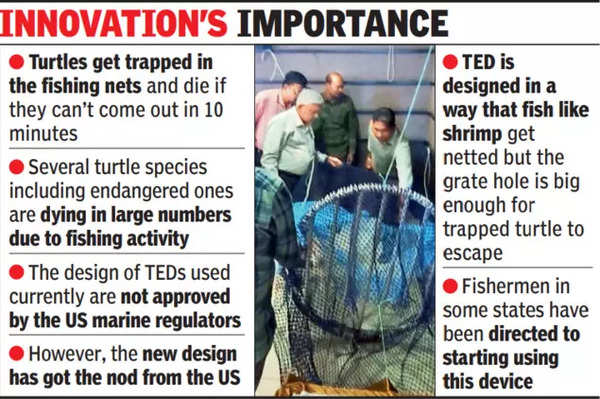A device with an innovative design developed by the scientists of Central Institute of Fisheries Technology (CIFT) is expected to come as a life saviour for sea turtles, some of them critically endangered that are dying in thousands after getting trapped in fishing nets.

The US, which has banned import of wild shrimps (those fished from sea) over concerns of turtle deaths, has also approved this product’s design. The approval from the National Oceanic and Atmospheric Administration (NOAA), the US-based scientific and regulatory agency, has kindled hopes of shrimp exports from India with Gujarat fishermen also expected to benefit. TED is a grid made of metal bars that is fitted with the nets in the trawler. Fish like shrimp can pass through but the holes are big enough for turtles to escape The ban in the US has adversely affected the price of Indian shrimps in other European countries and China where importers are paying a pittance, and the export has plummeted by around 59% in the last four years.
The scientists have developed a new turtle exclusion device (TED) to be installed in the fishing trawlers that will stop turtles from getting entangled in the nets. Madhu VR, principal scientist at CIFT said: “TED was being used earlier too, but it was not effective in stopping the turtles from getting netted. Also, its design was not following the NOAA standards as a result of which the US had banned Indian wild shrimp imports.” Madhu said they had a series of consultations with NOAA and finally developed a design according to their guidelines and meeting the specification of Indian fishing trawlers.
“CIFT scientists visited the US with this TED, which was evaluated by NOAA and this final design was approved. We are calling manufactures who have the capacity to produce these devices on a commercial scale,” he said. Recently, CIFT in collaboration with the Marine Products Export Development Authority (MPEDA) organized a workshop in Veraval town to demonstrate this device to the manufacturers of fishing nets and other stakeholders.
Kenny Thomas, a Veraval-based fish exporter said “Currently, we are able to export only farm shrimp to the US but once fishermen start using the TED, we will be able to send shrimps fished in the sea too.” Another leading fish operator said, “Gujarat’s share of shrimp exports to the US is miniscule. But due to the ban by the US, importers in other countries don’t pay the sufficient price. The price of Indian shrimp in the export market has fallen 59% in the last four years. If the US allows the import, buyers in other countries, especially Europe will be ready to pay more.”
A team of NOAA is expected to visit India in February 2024 to see that the fisherman community is using this TED. The team will randomly visit at specific intervals to ensure that this device is being used. Ashish Kumar Jha, a scientist at CIFT, Veraval said, “We have called companies making fishing nets and shown them the design. We urged them to promote and manufacture it.” Tulsi Gohil, president of Veraval Boat Association said, “We will decide to buy TEDs in bulk once the government gives us for use and we get an idea about its effectiveness as well as the price”